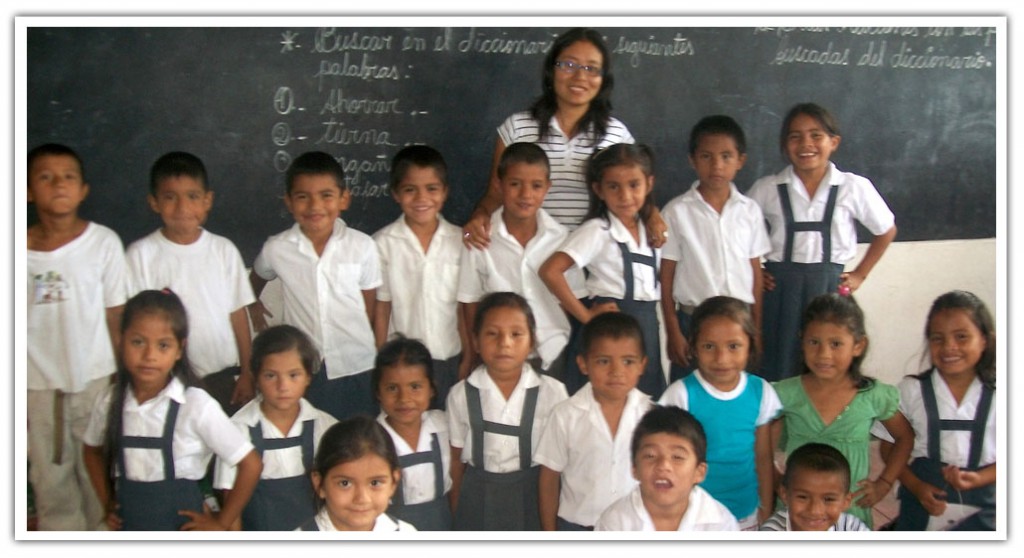Congratulations to Victoria Perez-Tello on being selected as Primate Education Network’s (PEN) February Educator of the Month! Special thanks to Fanny M. Cornejo for her nomination and blog submission.
Waking up in the rainforest can be a magical experience. Even before sunrise, noises from different creatures can be heard. If you are lucky, you can even listen to a romantic duet of complementing songs that orchestrate into the promise of fidelity and eternal love. This ritual happens every morning and the actors everywhere in Amazonian rainforests are couples of titi monkeys. These monkeys, members of the genus Callicebus, are known to live in small family groups, consisting of the reproductive couple and their offspring. Titi monkeys are also very cohesive and social animals. They don’t disperse far when feeding and traveling and they rest and sleep by snuggling together and entwining their tails. Also, the reproductive couple shares a strong bond; they are monogamous and the parental care is provided primarily by the male. Unfortunately, their morning ritual of singing in duo is also a great disadvantage for them, as humans can find and hunt them more easily.
In the lower northeastern slopes of the Peruvian Andes, a particular species of titi monkeys occurs. The San Martin titi monkey, Callicebus oenanthe, is found only in a tiny region of the San Martin department in Peru. Until recently, very little was known and being done for its protection. It is currently listed as Critically Endangered by the IUCN Red List. It was also recently included in the world’s 25 most endangered primates list at the International Primatological Society Congress in Cancun, Mexico in August 2012.
Since 2007, Proyecto Mono Tocón (PMT) has been studying and creating conservation actions for this species. Acknowledging that conservation goes hand-in-hand with education, PMT’s Project Director Jan Vermeer developed an education program for the organization. A young San Martin environmental engineer accepted the challenge and became the coordinator for this program. Her name is Victoria “Vicky” Perez-Tello and she is Primate Education Network’s February Educator of the Month.
Vicky was always interested in nature and aware of the challenges of living in one of the most deforested areas of Peru. This first-hand experience led her to choose a career in environmental engineering, searching for a path where she could contribute and make a change. She knew that research was being carried out in protected areas, for example, but there were few people involved in educating local communities, which she believed was a crucial element to any conservation initiative.
In 2008, that path was offered to her and she quickly accepted the opportunity. Her team implemented an education program in elementary and high schools in two localities of San Martin. “It was a challenge at first,” she told me. “Schoolteachers were not open to our education program. They didn’t understand its advantage and our motivation.” Fortunately, her team persisted and eventually gained the trust of the teachers. They signed an agreement with the Peruvian Ministry of Education authorities in this region and proceeded to teach in the local schools.
It was also a learning experience for them. With no formal training programs on primate conservation education already in place, Vicky’s team learned through experience over time about what worked and didn’t work. It was also a challenge because they involved communities of both rural farmers and indigenous groups.
Today, they are operational in eight schools in seven localities and reach approximately 1,000 students. They know the message needs to be delivered beyond the scope of their project and that is why they focus on training teachers. In addition, based on requests by local communities, they have trained and supported 150 farmers for the creation of a protected area for the species.
“This is a species that only occurs in this tiny region of Peru, and we, as people of San Martin, should feel proud of it,” said Vicky. In fact, one of her biggest achievements as an educator is that people touched by her program now acknowledge the importance of the San Martin titi monkey as an endemic species of their region. They understand this monkey’s role in the ecosystem and feel pride in contributing to its conservation.
Vicky was recently appointed President of Proyecto Mono Tocón, and with her integral vision, we are confident that she will bring even more success to this crucial project for the conservation of the San Martin titi monkey.
This blog post was written by Fanny M. Cornejo, Research Coordinator with Yunkawasi and Regional Coordinator for Peru, Bolivia, and Ecuador, South America with Primate Education Network.









